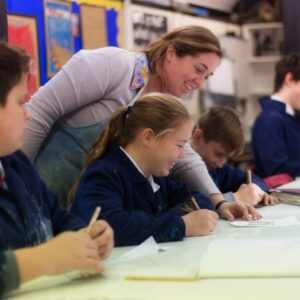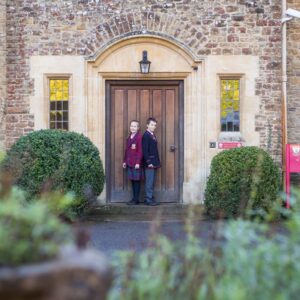Learning – The Early Years Foundation Stage
The Early Years Foundation Stage (EYFS) sets the standard for the learning, development and care of children from birth to five years old, covering children at Barrow Hills in Nursery, Kindy and Reception.
Within the EYFS there are seven key areas of learning. Three areas are particularly important for building a foundation for igniting children’s curiosity and enthusiasm for learning, forming relationships and thriving.
These are the prime areas:
- Personal, social and emotional development
- Communication and language
- Physical development
Children are also supported in four specific areas, through which the three prime areas are strengthened and applied.
The specific areas are:
- Literacy
- Mathematics
- Understanding the world
- Expressive arts and design
These areas of learning are taught through the children’s interests; and include a mix of adult-led and child-initiated learning.
The characteristics of effective learning run through and underpin all 7 areas of learning and development. The characteristics of effective teaching and learning are: playing and exploring – children investigate and experience things, and ‘have a go’; active learning – children concentrate and keep on trying if they encounter difficulties and enjoy achievements; creating and thinking critically – children have and develop their own ideas, make links between ideas, and develop strategies for doing things.
A timetable will be given out early in the term. If there are any changes another one will be issued later in the term.
If at any point, progress in one of the Prime or Specific areas gives cause for concern, class teachers will discuss this with parents and agree on practical pathways to support and monitor the pupil. This may be through in class support, group support, or through intervention sessions with a member of staff. The Head of Learning Support, Head of Pre-Prep and Key Person (Class Teacher in Kindy and Reception) will guide parents, should there be a need to engage with external agencies. This may include Speech and Language or Occupational therapies. Further details on our learning support provision can be found in the SEND policy, which can be found on our website.
Key Person
Across Early Years, children are assigned a Key Person. This is the child’s Class Teacher in Kindy and Reception. In our Early Years Foundation Stage, we believe that children settle best when they have a key person to relate to, who knows them and their parents well, and who can meet their individual needs. In addition to your child’s key person, other members of the Early Years team will also contribute to your child’s learning journey on Tapestry.
The Key Person will ensure that learning and care is tailored to a child’s individual needs, help children become familiar with the setting, and offer a settled relationship for the children. In addition, the Key Person will engage and support parents in guiding a child’s development at home, as well as help parents engage with more specialist support if appropriate.
Tapestry
In Early Years, Tapestry is your child’s online Learning Journal and we will use it to update you on the learning that your child is doing in school at the end of each half term. Each week you will receive a ‘memo’ with what we have been focussing on, or what we are going to be looking at the following week. In Kindy you will find weekly memos regarding our book and sound of the week, as well as half-termly reports detailing your child’s progress. Tapestry is a great way of engaging your child in a conversation about their learning at school. It is also a wonderful means of two way communication so feel free to post your own observations. We enjoy seeing what activities and learning the children are doing outside of school. If you have any problems with logging on, please contact itsupport@barrowhills.org.
Show and Tell
The children have an opportunity for ‘Show and Tell’ during the week. It is a very important feature of the week, giving children the opportunity to talk in front of their peers and answer questions. It is enormously beneficial in many ways but particularly for speaking and listening skills. In Kindy, ‘show and tell’ is linked to the sound of the week; in Reception, small items (ideally linked to our topic or of other educational value) that fit in the children’s trays are most appreciated. Please do not bring in toys from home.
Maths and Literacy
In maths in the Early Years there is a focus on number and numerical patterns. The children learn through very practical, hands-on and fun activities.
In literacy, we follow the ‘Read, Write Inc’ programme, to provide continuity for children’s progression into Year 1 and beyond. In Kindy, children start to learn a sound a week; in Reception, children learn a sound a day with consolidation . There is useful information for parents and video on how to say the sounds online at https://www.ruthmiskin.com/en/find-out-more/parents/.
A phonics workshop is held for parents of Reception pupils during the first half of the autumn term when you are invited to learn more about the scheme we use across the Pre-Prep and how you can support your child at home.
The children also have library sessions in our school Library, to encourage their love of books.
Meal Times
The children are provided with water at all times and a morning snack, consisting of fresh fruit and another snack. A two-course school lunch is provided for all children. All children eat their lunch in the dining hall. The Nursery and Kindy children are served their food on plates on tables, while Reception collect their food from the servery, thus promoting independence. All food is cooked and prepared on site in our own kitchens. Children are encouraged to take three kinds of food on their plate i.e. meat or protein, vegetables or salad and carbohydrate. A vegetarian alternative is offered. If children have a food allergy, this should be indicated through the online joining paperwork. All medical needs and other dietary requirements should be supported in writing. The School is able to accommodate most dietary needs and encourages parents to discuss these with us. A no nut policy is operated. All children with dietary requirements are provided with a colour-coded lanyard. These are invaluable to the kitchen staff, as they serve the pupils at the servery. EYFS staff eat with the children and encourage them to use a knife and fork correctly, and of course promote good table manners. Weekly menus are available on the School website are displayed in the Nursery foyer. Nursery and Kindy children have a snack in the afternoon consisting of fresh fruit. They eat this seated in their classroom, as they do for morning snack, with staff. Children who stay for Club have a piece of fruit and a biscuit, seated at the table with staff. Those who attend Breakfast Club or stay for Tea after school, sit at the table to eat once served at the servery and are supervised by staff at the table.



